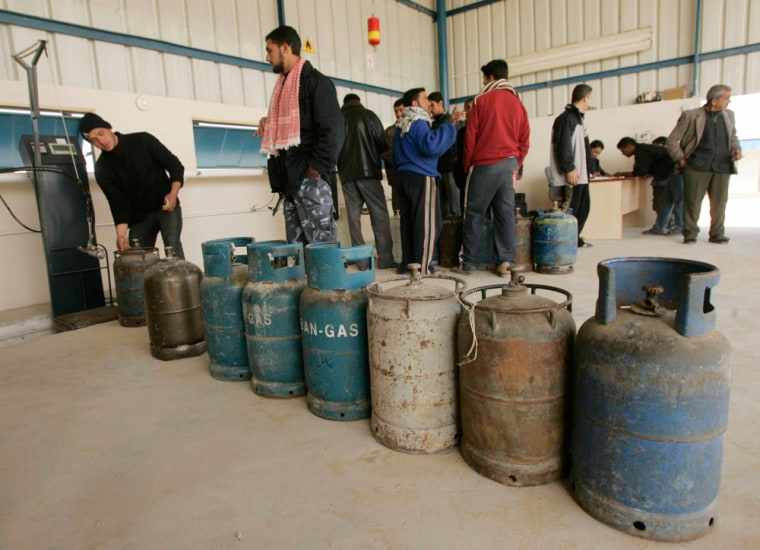Gaza City was plunged into darkness after nightfall Sunday when officials from ruling Hamas shut down the territory’s only electricity plant after Israel cut off fuel supplies.
Israel blockaded Gaza Thursday as a pressure tactic against militants who have been firing rockets across the border every day. The stricken power plant generates about one third of Gaza’s electricity. The rest, which comes from Israel, was not affected by the blockade, Israeli officials said.
Health officials and human rights groups warned of a humanitarian crisis in Gaza as a result of the Israeli blockade, with the move certain to make life more difficult for the 1.5 million residents of the already impoverished territory.
Shlomo Dror, a spokesman for Israel's defense ministry, said Gaza has enough fuel and accused Palestinian officials of trying to create the impression of a crisis that did not exist.
Israel sealed all crossings into Gaza last week because of a spike in rocket barrages against southern Israel from the territory. Gazans have been living with fuel cutbacks, power outages and shortages of supplies for months, but the power plant's closure would mean the loss of a third of the electricity for the territory's residents. It would largely affect the 400,000 people in Gaza City, the territory's main population center.
"We are going to shut down completely within hours," said Rafik Maliha, director of the power plant. The regular fuel shipment from Israel hadn't arrived Sunday because the fuel terminal, Nahal Oz, was closed, and the plant has nearly no stored reserves, he said.
The U.N. organization in charge of Palestinian refugees, UNRWA, warned the move would drastically affect hospitals, sewage treatment plants and water facilities.
'Defies basic humanitarian standards'
"The logic of this defies basic humanitarian standards," said Christopher Gunness, spokesman for the U.N. Relief and Works Agency.
In addition to the fuel it receives from Israel to power its electrical plant, Gaza gets about two-thirds of its electricity directly from Israel. Israeli officials said that supply would not be affected.
Israel, with Egypt's cooperation, has blockaded Gaza since June, when the Islamic militants of Hamas violently seized power there. Under Hamas rule, militants have been free to fire near-daily rocket barrages at Israeli towns around Gaza, terrorizing swaths of southern Israel. The rockets have killed 12 Israelis in the past six years.
Even after imposing the blockade, Israel allowed basic food items and humanitarian supplies into Gaza. That changed Thursday, when Defense Minister Ehud Barak ordered all crossings closed after days of exceptionally intense rocket fire.
The Nahal Oz fuel terminal remained closed Sunday because of the Palestinian rocket fire, defense ministry spokesman Dror said. But there is still fuel in Gaza, and the closure will not lead to a crisis, he said.
"If they shut it down, it's not because of a fuel shortage, but because they want to create the impression of a crisis," Dror said. The power plant shutdown, he said, would "not be comfortable, but it's not a humanitarian crisis."
Israeli officials had no precise definition of what constitutes a humanitarian crisis.
In related news Sunday, Barak repeated that Israel was continuing to prepare for a large-scale operation in Gaza against rocket squads.
Israel's military regularly carries out airstrikes and short ground incursions in Gaza, operations that have killed dozens of militants but have not halted the rocket fire. The Israeli government appears reluctant to order a broad ground offensive in Gaza, likely because of the possibility of high casualties and because similar operations in the past haven't had reined in the rocket fire.
